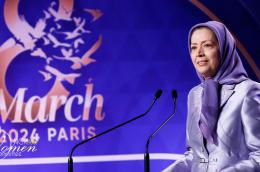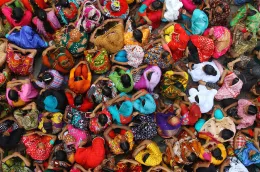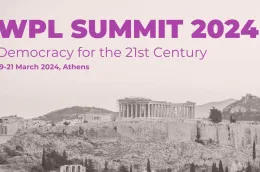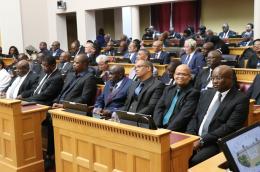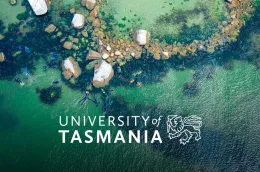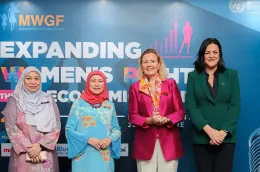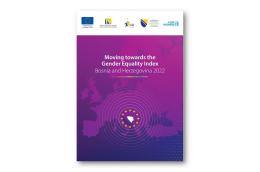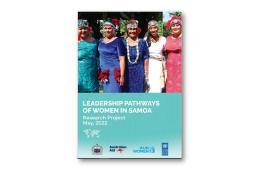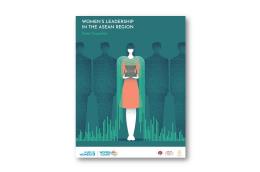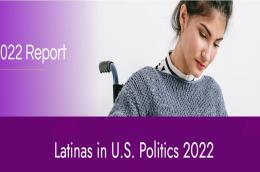Women's Leadership
Main navigation
A very moving and inspirational #IWD2024 conference was held today, Saturday, February 24, 2024, in Paris. The conference featured the NCRI President-elect Maryam Rajavi as the keynote speaker, and dozens of other influential women from around the world. Mrs. Rajavi emphasized that women’s active and equal participation in political leadership is the key to realize gender equality in any society.
The NCRI President-elect also reiterated that women’s equality and leadership is indispensable to the fight against a misogynistic regime. She also called on young women in Iran to rise up and save the millions of women who are victims of the mullahs’ oppression, by overthrowing the regime. Following is the full text of her speech:
Women’s Active and Equal Participation in Political Leadership Is Indispensable to Democracy
On the eve of International Women’s Day, we pay tribute to the women who have championed the cause of equality, made sacrifices, and paved the way for others, ushering in a new era.
As a result of these struggles, hardships, and four decades of resistance against religious tyranny, I stand here today with pride to underscore the following truths:
Women are the actors for change.
Click here to read the full article published by Women's Committee NCRI on 24 February 2024.
Image source: Women's Committee NCRI
The topic of gender equality has been a prominent subject of discussion in the international discourse for a considerable period. The acknowledgment of women’s rights and their involvement in diverse domains of society, including the political realm, has been a protracted and hard-won struggle.
Within the domain of global politics, this conflict assumes notable importance, given that choices taken within the international arena carry extensive ramifications that affect individuals around the globe. Despite some advancements, achieving gender equality in the realm of international politics remains a challenging objective, with women persistently facing a lack of representation in crucial positions of power and influence. The progression of gender equality within the realm of international politics is a crucial yet unfinished undertaking, necessitating the implementation of comprehensive strategies that enable women and eliminate obstacles to their full engagement in decision-making procedures.
In the realm of international politics, there has been notable advancement in the pursuit of gender equality. This achievement can be attributed to the concerted efforts of international organizations, governments, and civil society, all of whom have been actively advocating for more women’s participation in global decision-making mechanisms. The milestone of women’s empowerment was signified by the acceptance of international agreements such as the Beijing Declaration and Platform for Action by the United Nations in 1995 (Women).
Click here to read the full article published by Eurasia Review on 26 February 2024.
Image source: Eurasia Review
In the heart of Athens, beneath the watchful eyes of history, a groundbreaking event is set to unfold that promises to reshape the landscape of political leadership across the globe. From April 19-21, the Women Political Leaders (WPL) network will convene for its annual summit, a gathering that not only honors the strides taken towards gender equality in political arenas but also, under the patronage of President Katerina Sakellaropoulou, aims to dismantle the longstanding barriers still facing women in politics today. Organized in collaboration with Greece's Ministries of Tourism and Cohesion & Family Affairs, this summit isn't just a meeting; it's a testament to the country's commitment to leading by example in the quest for a more inclusive political discourse.
Empowering Women Leaders: The Agenda
The Athens summit is more than a ceremonial congregation; it's a beacon of hope and a call to action. With over 200 delegates expected to participate, the discussions will pivot around not just celebrating past achievements but forging new pathways to ensure women's voices are not just heard but are influential in shaping policies and decisions. The highlight of the event is an awards ceremony that pays tribute to women politicians who have been instrumental in breaking down stereotypes and challenging the discrimination that has historically sidelined women from political leadership roles. Among the awardees is none other than Greek President Katerina Sakellaropoulou, whose own career reflects the summit's core mission of elevating women to positions of power and influence.
Click here to read the full article published by BNN Breaking News on 26 February 2024.
Image source: BNN Breaking News
In a parliamentary democracy like Namibia, all power shall be vested in the people through freely elected representatives exercising this power.
Some 51 % of Namibia’s population are women who still face many injustices based on their gender.
Namibia has a long history of many types of social inequality, including gender inequality.
Many challenges women face in Namibia today have been influenced by the historical imbalance of power between women and men, social structural factors such as poverty, unemployment and related social problems.
This includes economic inequalities, like no acknowledgement of unpaid domestic work women disproportionately often do in their households, being exposed to gender-based violence, or being single mothers without any or insufficient support from children’s fathers.
Some of these inequalities are based on political, cultural, traditional or religious beliefs that promote gender inequality.
For example, the cultural concept of the alleged supremacy of men over women.
This makes it even more important that women are represented in parliament and have a say in who makes decisions in Namibia by participating more in the election process and casting their votes.
The voices of women must be present and respected in decision-making at all levels.
Click here to read the full article published by The Namibian on 22 February 2024.
Image source: The Namibian
Discover how the University of Tasmania's Pathways to Politics for Women program is empowering aspiring female politicians in Tasmania. Supported by political vanguards, this initiative is reshaping the political landscape and fostering inclusive representation.
Imagine a political landscape where the voices of women are not just heard but amplified, where the halls of power resonate with the diverse experiences and perspectives of over half the population. This vision is on the cusp of becoming a reality in Tasmania, as the University of Tasmania steps into the spotlight with its groundbreaking Pathways to Politics for Women program. Supported by a formidable alliance of Tasmania's political vanguards, this initiative is poised to dismantle the barriers that have historically sidelined Tasmanian women from political arenas.
A Unifying Endeavor
The Pathways to Politics for Women program, originally kindled in 2016, has burgeoned into a beacon of hope and action for aspiring female politicians across Australia. Its expansion into Tasmania, facilitated by the Trawalla Foundation's generous funding, is a testament to its remarkable success in catalyzing political careers. The program's ethos, championed by figures like Tasmania's first female premier Lara Giddings, former Greens leader Christine Milne, and past premier Will Hodgman, transcends partisan lines, emphasizing the universal benefit of diversifying political representation.
Click here to read the full article published by BNN Breakings News on 22 February 2024.
Image source: BNN Breakings News
Discover the impactful conversations and calls to action from the Women's Rights Conference 2024 in Malaysia, addressing the critical issues of female political representation and the collective efforts towards gender equality.
In the heart of Nairobi, a seismic shift in the narrative of law enforcement is underway. The Kenyan government, in a move as bold as it is necessary, has announced a substantial 40% salary increase for National Police officers, a decision set to roll out in July this year.
This initiative, born from the recommendations of the Maraga-led committee, is not merely a financial adjustment; it's a beacon of hope, signaling a transformative era for police welfare and institutional reforms within the police and prisons departments.
Click here to read the full article published by BNN Breakings News on 24 February 2024.
Image source: BNN Breakings News
